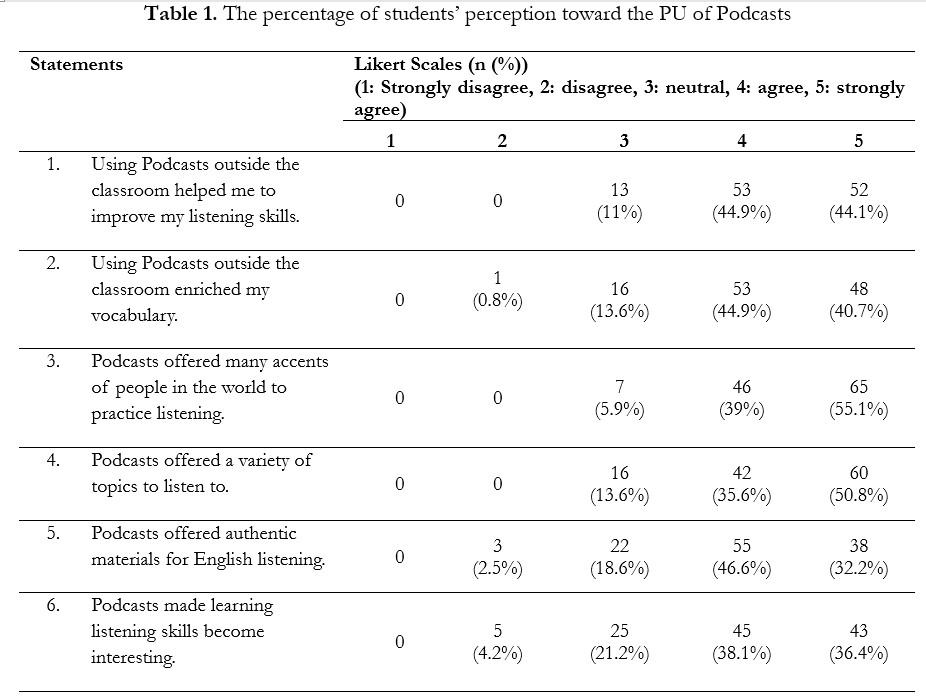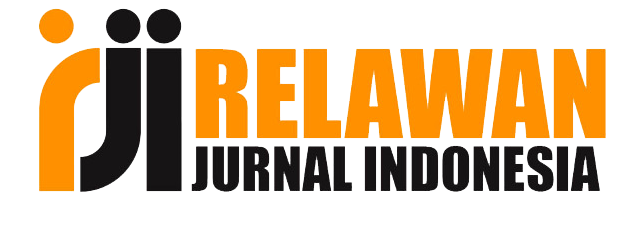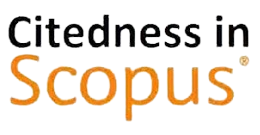Examining students’ perceptions of Podcasts as authentic materials for self-access listening practice
DOI:
https://doi.org/10.33474/j-reall.v5i1.20725Keywords:
English linguistics students’ perceptions, listening skills, mixed methods, PodcastsAbstract
The development of listening skills has long been a topic of interest in the field of language teaching and learning. In recent years, there has been a growing trend in utilizing Podcasts as a means of language acquisition, particularly for enhancing listening skills. This approach has gained significant popularity due to the various advantages it offers. However, there is a considerable lack of related research in the context of Vietnam, particularly in university-level academic listening classes. This study addresses this gap by investigating the perceptions of 118 intermediate English linguistics students at International University, Vietnam National University HCMC, regarding the use of Podcasts to enhance their listening skills beyond the classrooms. Data collection was conducted using a mixed-methods approach, which involved the use of an online survey questionnaire as well as interviews conducted through the Zoom application. A total of 118 intermediate English linguistics students were involved in the survey questionnaire, whereas the interviews were conducted with a smaller sample size of eight students. Results showed positive perceptions regarding the usefulness of Podcasts in post-classroom listening practice. The participants reported that Podcasts were valuable for improving their ability to understand spoken language, providing an enjoyable and entertaining experience, and offering flexibility beyond traditional classroom settings. This study indicates the potential of Podcasts as effective tools for improving English listening skills and, therefore, highlights the need for teachers to consider integrating Podcasts as a resource for teaching and learning listening skills beyond the classroom.
References
Abdulrahman, T., Basalama, N., & Widodo, M. R. (2018). The impact of Podcasts on EFL students’ listening comprehension. International Journal of Language Education, 2(2), 23-33. https://doi.org/10.26858/ijole.v2i2.5878
Ahmed, F. (2016). Using Podcasts to improve listening comprehension in the Arabic classrooms. Arab Journal of Research and Education, 6(2).
Alzamil, J. (2021). Listening Skills: Important but difficult to learn. Arab World English Journal, 12 (3) 366-374. https://dx.doi.org/10.24093/awej/vol12no3.25
Archibald, M. M., Ambagtsheer, R. C., Casey, M. G., & Lawless, M. (2019). Using Zoom videoconferencing for qualitative data collection: Perceptions and experiences of researchers and participants. International Journal of Qualitative Methods, 18, 1-8. https://doi.org/10.1177/1609406919874596
Aspers, P., Corte, U. (2019). What is qualitative in qualitative research. Qual Sociol, 42, 139–160. https://doi.org/10.1007/s11133-019-9413-7
Bree, R. T., & Gallagher, G. (2016). Using Microsoft Excel to code and thematically analyze qualitative data: A simple, cost-effective approach. All Ireland Journal of Higher Education, 8(2). 2811-2824.
Bui, Q. T. T., & Duong, T. M. (2018). Creating an active environment for students’ willing to communicate in English. Scientific Journal of Saigon University, 59, 54-61.
Campbell, S., Greenwood, M., Prior, S., Shearer, T., Walkem, K., Young, S., … Walker, K. (2020). Purposive sampling: Complex or simple? Research case examples. Journal of Research in Nursing, 174498712092720. doi:10.1177/1744987120927206
Colney, L. (2023). Review of application software used in educational research. IJFMR-International Journal for Multidisciplinary Research, 5(3), 1-10. https://doi.org/10.36948/ijfmr.2023.v05i03.2816
Creswell, J. W., & Clark, V. L. P (2018). Designing and conducting mixed methods research (3rd ed.). Thousand Oaks, CA: Sage
Davis, F. D. (1989). Perceived usefulness, perceived ease of use, and user acceptance of information technology. MIS Quarterly, 13(3), 319–340. doi:10.2307/249008.
Gilakjani, A. P., & Sabouri, N. B. (2016). Learners’ listening comprehension difficulties in English language learning: A literature review. English language teaching, 9(6), 123-133. http://dx.doi.org/10.5539/elt.v9n6p123
Gonulal, T. (2020). Improving listening skills with extensive listening using Podcasts and vodcasts. International Journal of Contemporary Educational Research, 7(1), 311-320. DOI: https://doi.org/10.33200/ijcer.685196
Gray, L. M., Wong-Wylie, G., Rempel, G. R., & Cook, K. (2020). Expanding qualitative research interviewing strategies: Zoom video communications. The Qualitative Report, 25(5), 1292-1301. https://doi.org/10.46743/2160-3715/2020.4212
Haddad, R. J., & Kalaani, Y. (2014). Google Forms: A real-time formative feedback process for adaptive learning. Paper presented at 2014 ASEE Annual Conference & Exposition, Indianapolis, Indiana. doi:10.18260/1-2--20540
Hamouda, A. (2013). An investigation of listening comprehension problems encountered by Saudi students in the EL listening classroom. International Journal of Academic Research in Progressive Education and Development, 2(2), 113-15.
Harahap, S. D. (2020). Podcast impacts on students’ listening skill: A case study based on students’perceptions. Jurnal Inovasi Penelitian, 1(4), 891-900. https://doi.org/10.47492/jip.v1i4.166
Hoan, H.V, & Nguyen, T. T. C. (2021). Exploring the use of Podcasts in improving English listening comprehension skills among English-major students at FPT University, HCM. International Journal of Innovative Research in Engineering & Multidisciplinary Physical Sciences, 9(6), 71-79.
Holmes, B. (2019). Receptive skills for English teachers: how to teach listening and reading. English for ASIA. https://hongkongtesol.com/blog/receptive-skills-english-teachers-how-teach-listening-and-reading
Khamkhien, A. (2010) Teaching English speaking and English-speaking tests in the Thai context: A reflection from Thai perspective. English Language Teaching, 3(1), 184-190. https://doi.org/10.5539/elt.v3n1p184
Le, X. M., & Le, T. T. (2022). Factors affecting students’ attitudes towards learning English as a foreign language in a Tertiary Institution of Vietnam. International Journal of TESOL & Education, 2(2), 168–185. https://doi.org/10.54855/ijte.22229
Lestary, N. L. G. W. (2019). The use of songs to improve students’ listening comprehension ability. Yavana Bhasha: Journal of English Language Education, 2(2), 34-45. https://doi.org/10.25078/yb.v2i2.1024
Hasan, M. M., & Hoon, T. B. (2013). Podcasts applications in language learning: a review of recent studies. English Language Teaching, 6(2), 128-135. https://doi.org/10.5539/elt.v6n2p128
Maziriri, E. T., Gapa, P., & Chuchu, T. (2020). Student perceptions towards the use of YouTube as an educational tool for learning and tutorials. International Journal of Instruction, 13(2), 119-138. https://doi.org/10.29333/iji.2020.1329a
McNamara, S. W., & Haegele, J. A. (2021). Undergraduate students’ experiences with educational Podcasts to learn about inclusive and integrated physical education. European Physical Education Review, 27(1), 185-202. doi:10.1177/1356336X20932598
McNeish, D. (2018). Thanks coefficient alpha, we’ll take it from here. Psychological Methods, 23(3), 412–433. https://doi.org/10.1037/met0000144
Nardi, P.M. (2018). Doing survey research: A guide to quantitative methods (4th ed.). Routledge. https://doi.org/10.4324/9781315172231
Nguyen, H.D.N. (2020). Understanding EFL students’ use of listening strategies in watching English captioned movies. Vietnam Journal of Education, 4(2), 37–46. https://doi.org/10.52296/vje.2020.18
Nishanthi, R. (2018). The importance of learning English in today world. International Journal of Trend in Scientific Research and Development, 3(1), 871-874. https://doi.org/10.31142/ijtsrd19061
Rachmaniputri, F. I., Purnawarman, P., & Gunawan, M. H. (2021). Students’ perceptions towards the use of Podcasts in listening class. Proceedings of the Thirteenth Conference on Applied Linguistics (CONAPLIN 2020), 546, 179-187. doi:10.2991/assehr.k.210427.028
Rebman Jr, C. M., Booker, Q. E., Wimmer, H., Levkoff, S., McMurtrey, M., & Powell, L. M. (2022). An industry survey of analytics spreadsheet tools adoption: Microsoft Excel vs Google Sheets. In Proceedings of the EDSIG Conference ISSN, 2473, 4901.
Saragih, D., Marpaung, A., & Saragih, R. P. S. (2022). The use of Podcasts in improving students’ listening skill of senior high school. International Journal Corner of Educational Research, 1(2), 57–68. https://doi.org/10.54012/ijcer.v1i2.81
Siregar, E. Y. & Manurung, I. D. (2020). The effect of using authentic material as media on the students’ achievement in listening. English Teaching and Linguistics Journal (ETLiJ), 1(1), 5-15. https://doi.org/10.30596/etlij.v1i1.4121
Smith, J.A. (2015). Qualitative psychology: A practical guide to research methods. Sage, London.
Taber, K. S. (2018). The use of Cronbach’s alpha when developing and reporting research instruments in science education. Research in science education, 48, 1273-1296. https://doi.org/10.1007/s11165-016-9602-2
Taherdoost, H. (2019). What is the best response scale for survey and questionnaire design; review of different lengths of rating scale/attitude scale/Likert scale. Hamed Taherdoost, 1-10.
Theofanidis, D., & Fountouki, A. (2018). Limitations and delimitations in the research process. Perioperative Nursing-Quarterly scientific, online official journal of GORNA, 7(3), 155–162. https://doi.org/10.5281/zenodo.2552022
Wadood, F., Akbar, F., & Ullah, I. (2021). The importance and essential steps of pilot testing in management studies: A quantitative survey results. Journal of Contemporary Issues in Business and Government, 27(5), 2021.
Ward, J. (2019). Podcasts in Vietnam. Insights on PR and marketing in Vietnam and ASEAN. https://blog.eloqasia.com/2019/01/08/podcast-in-vietnam /
Wiemken, T. L., Furmanek, S. P., Mattingly, W. A., Haas, J., Ramirez, J. A., & Carrico, R. M. (2018). Googling your hand hygiene data: Using Google Forms, Google Sheets, and R to collect and automate analysis of hand hygiene compliance monitoring. American Journal of Infection Control, 46(6), 617–619. doi:10.1016/j.ajic.2018.01.010
Yeh, C. (2013). An investigation of a Podcasts learning project for extensive listening. Language Education in Asia, 4, 135-149. http://dx.doi.org/10.5746/LEiA/13/V4/I2/A04/Yeh
Yoestara, M., & Putri, Z. (2019). Podcast: An alternative way to improve EFL students’ listening and speaking performance. Englisia: Journal of Language, Education, and Humanities, 6(1), 15-26. doi:10.22373/ej.v6i1.3805

Downloads
Published
How to Cite
Issue
Section
License
Copyright (c) 2023 Thai Bao Ngoc Cao, Diem Bich Huyen Bui

This work is licensed under a Creative Commons Attribution 4.0 International License.
Authors who publish this journal agree to the following terms:
- Authors retain copyright and grant the journal right of first publication with the work simultaneously licensed under a Creative Commons Attribution License that allows others to share the work with an acknowledgement of the work's authorship and initial publication in this journal.
- Authors can separately make additional contractual arrangements for non-exclusive distribution published by the journal (e.g., publish it in a book), with an acknowledgement of its initial publication in this journal.
- Authors are allowed and encouraged to send their work via online (e.g., in the institutional repositories or their website) after published by the journal.





















